Providing your furry friend with a balanced and proper nutritious diet is essential to help prevent various health issues and ensure they have the energy to enjoy life to the fullest.
The Association of Pet Obesity Prevention estimates that each year in the United States, 56% of dogs and 60% of cats are obese.
Choose healthy raw diets, including chicken, fish, bone broth, carrots, eggs, brown rice, and pumpkin, to provide essential nutrients required for proper cell function and ward off heart disease, diabetes, and pancreatitis, as well as having a shorter lifespan.
Read on to explore seven meals that provide proper nutrition for dogs.
7 Meals that Provide Proper Nutrition for Dogs
The report found that U.S. pet food manufacturers use roughly 8.65 million tons of animal and plant-based ingredients for pet food to provide the complete nutrition that pets need.
Owners may choose homemade food for their pets for healthy choices, but at the same time, they should be aware of the need of supplement nutrition.
Homemade meals are only sometimes the best meal option for dogs because they need more essential nutrients, which human foods lack.
Moreover, there are several human foods that you should never share with your canine.
Let us check some meals that provide proper nutrition for dogs.
1. Chicken
Chicken is an excellent source of protein for dogs, essential for building and repairing muscles and tissues.
It is a relatively lean meat, which can benefit dogs that need to watch their weight.
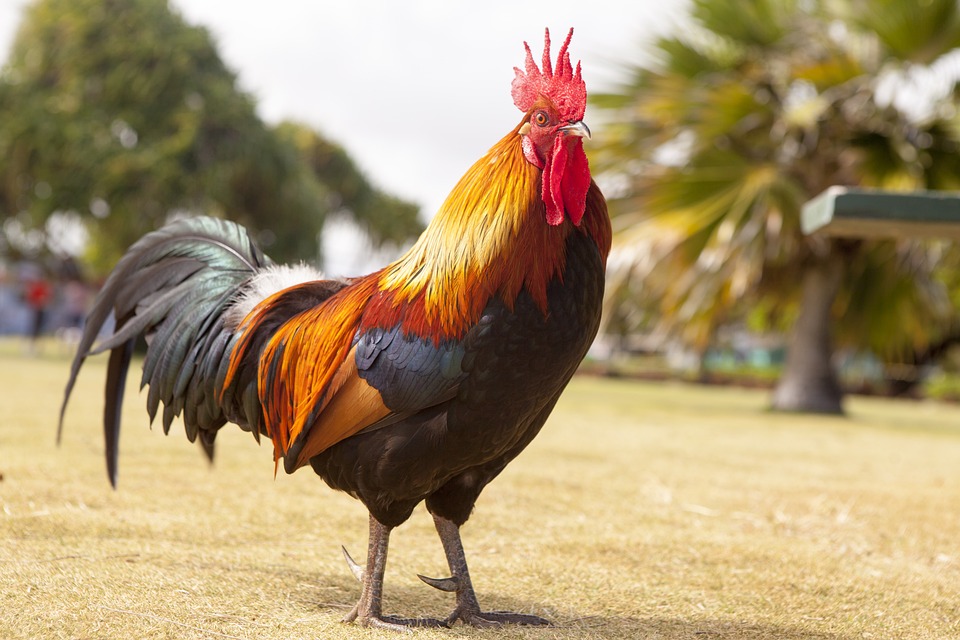
- It is a good source of essential amino acids that dogs need in their diets.
- It contains various vitamins and minerals that can contribute to a dog's overall health, including B vitamins, iron, zinc, and copper.
- It contains Omega 6 fatty acids, which help absorb essential nutrients and vitamins, manage inflammation, and maintain healthy skin and fur.
- l It provides a significant source of energy for your dogs.
Additionally, chicken is often used as an ingredient in commercial dog food because it is highly digestible for most dogs.
However, it is essential to cook chicken thoroughly and avoid giving your dog chicken bones, which can splinter and cause choking or internal injuries.
Once or twice a week, you can include a small quantity of boiling, skinless chicken with your dog's regular diet.
Otherwise, you can use a bit of cooked chicken as a high-value reward during training.
2. Fish
Feeding your dog small, oily fish regularly is better at providing them with various essential nutrients.
Some of the health benefits of fish include:
- Fish is a rich source of omega-3 fatty acids, which can help promote healthy skin and coat, reduce inflammation, and support cognitive function.
- It is also a good source of protein, vitamins D and B12, and minerals such as calcium, phosphorus, and selenium.
- If your dog suffers from particular meat allergies, fish can play an excellent replacement part.

However, it is crucial to be cautious when feeding fish to your dog. Some types of fish, such as salmon, can contain harmful parasites and bacteria that can make your dog sick.
Besides, it is also essential to ensure that any fish you feed your dog is cooked thoroughly and boneless to prevent choking hazards.
Also, be mindful of your dog's individual dietary needs.
Start feeding your dog smaller amounts first. You can start with 1/2 a sardine per day for smaller dogs, and larger dogs work up to as much as a tin every other day.
You can even consult your veterinarian to determine the best type and amount of fish to include in their diet.
3. Bone Broth
Bone broth is a nutrient-rich liquid that is made by boiling animal bones and connective tissue for several days with apple cider vinegar.
This slowly breaks down all these nutrients, making them highly bioavailable to the body.
Some nutrients found in bone broth include calcium, potassium, magnesium, phosphorus, glucosamine, chondroitin, amino acids, collagen, hyaluronic acid, and minerals.
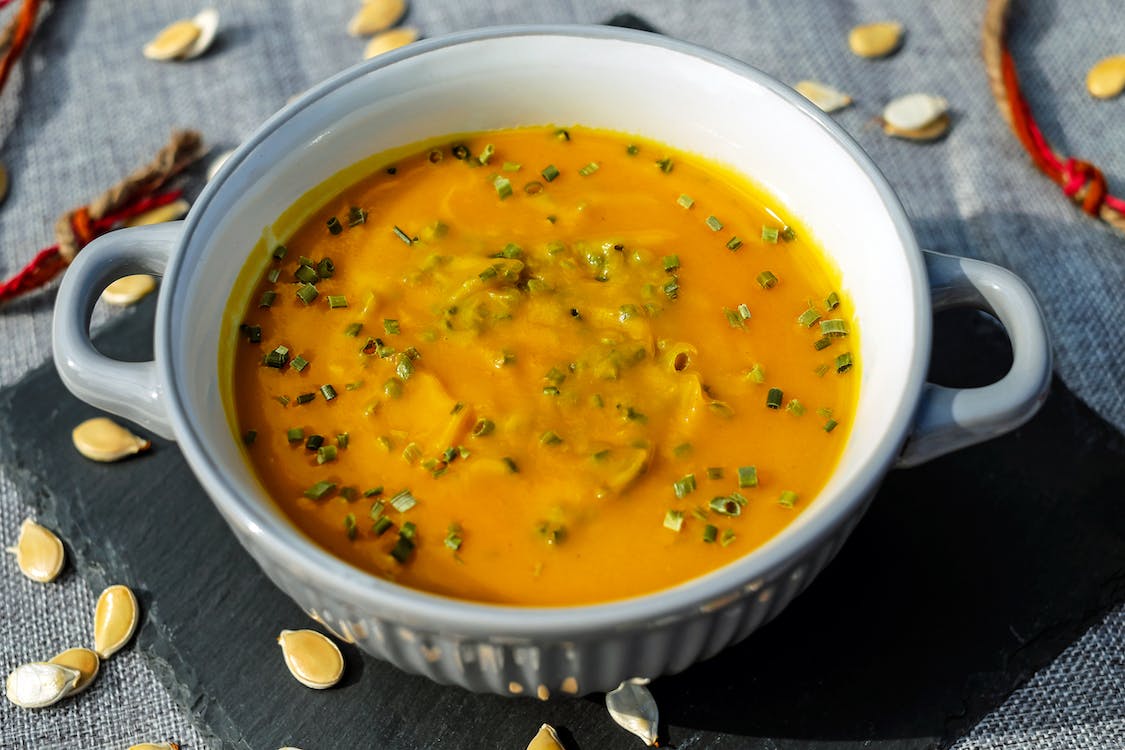
It provides such tremendous benefits for your dog. It is a healing potion.
- It can help support joint health, muscles, tendons, and ligaments, boost the immune system, and promote healthy digestion.
- It assists in detoxing the liver.
- Additionally, bone broth is an excellent source of hydration for dogs and can help keep them hydrated when they are sick or recovering from an illness.
- It alleviates joint pain.
- It provides minerals and increases their absorption.
- It boosts the immune system.
- It improves skin health.
- It supports brain function.
Overall, bone broth is a nutritious and delicious addition to a dog's diet.
You can also make a frozen treat using broth on a hot day as a refreshing snack for your dog.
4. Carrots
As part of healthy human food, carrots are also healthy options for dogs and make a nutritious add-on to meals.
It performs various functions, from improving their eyesight to reducing cancer risk.
It has a great source of fiber, vitamins, and minerals that can provide several health benefits to dogs.
- It is rich in beta-carotene, an essential antioxidant that helps boost immune function, promote eye health, and maintain healthy skin and coat.
- Since carrots are low in calories and fiber, it is an excellent option for dogs needing to lose or maintain a healthy weight.
- The high fiber content in carrots can also help improve digestive health and regulate bowel movements.
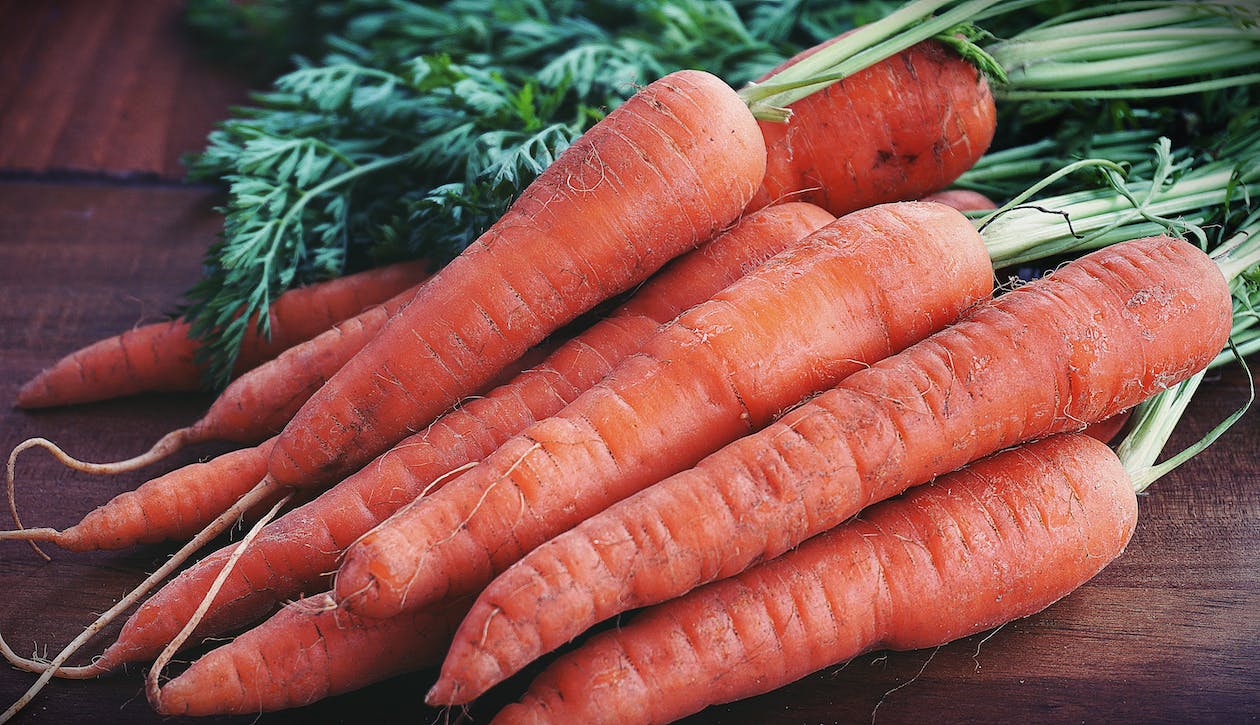
Carrots can be fed to dogs raw or cooked, but cutting them into small pieces is necessary to prevent choking.
Moreover, when it comes to serving carrots to your dog, they should make up less than 10% of your dog’s daily calorie intake.
You can incorporate carrots into your dog’s diet as a treat, a topper for your dog’s regular meals, or as a frozen treat.
Also, always consult with your veterinarian before changing your dog's diet.
5. Eggs
Eggs are packed with a great source of protein and provide many essential nutrients for dogs.
They are also easy to digest and can be an excellent alternative to meat for dogs that have digestive issues.
- Eggs are an excellent source of protein, which is crucial for your dog's muscle development and overall health.
- The protein in eggs is highly digestible and contains all the essential amino acids that dogs need.
- Additionally, eggs contain vitamins A, D, E, and B12, minerals, as well as iron, selenium, and riboflavin that can also help support a healthy coat.
- The egg yolk is also a good source of healthy fats and can be beneficial for a dog's coat and skin.
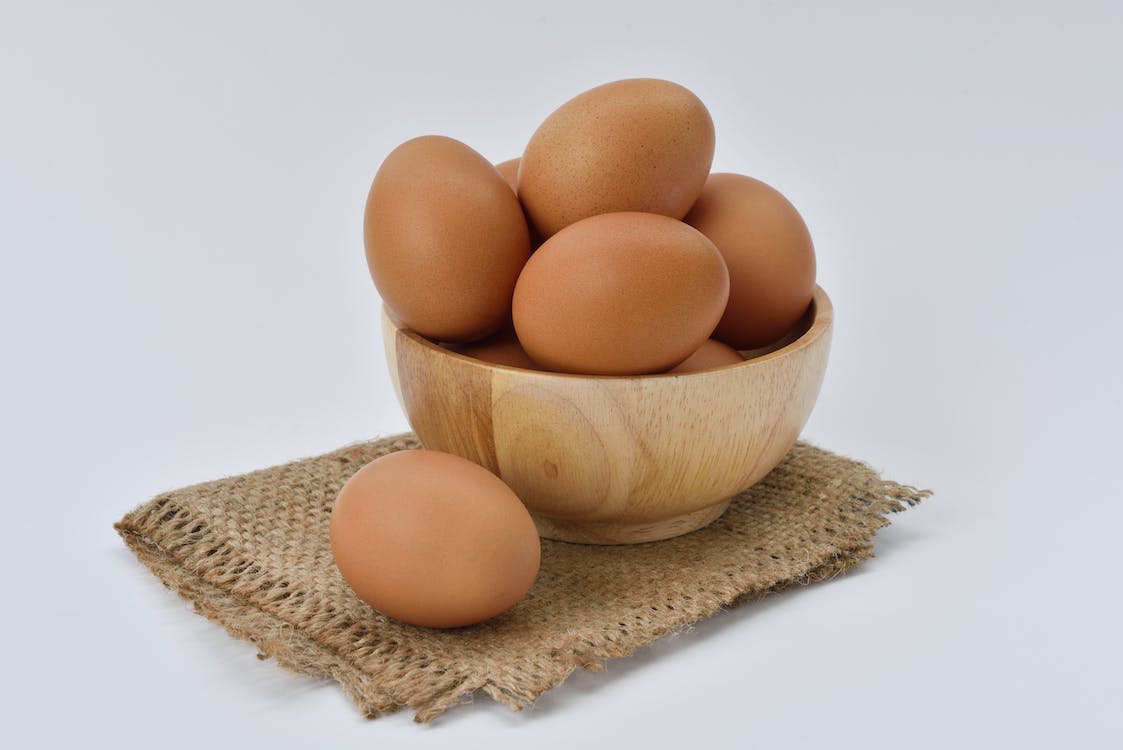
However, it is essential to note that while eggs can be a healthy addition to a dog's diet, they should not be the sole source of nutrition and should be fed in moderation.
6. Brown Rice
Brown rice can be a nutritious carbohydrate source that provides dogs with energy.
It also provides a good source of fiber, minerals, and vitamins, including thiamin, niacin, and vitamin B6, as well as magnesium, phosphorus, and manganese.
- Brown rice is a complex carbohydrate that takes longer to digest, which can help maintain stable blood sugar levels in dogs.
- It is also a good alternative for dogs allergic to other grains.
- The fiber in brown rice can help regulate digestion and promote a healthy gut.
- The carbohydrates in brown rice can provide sustained energy for your dog, helping them maintain an active and healthy lifestyle.
- Brown rice is a low-fat, low-calorie food that can help your dog maintain a healthy weight.
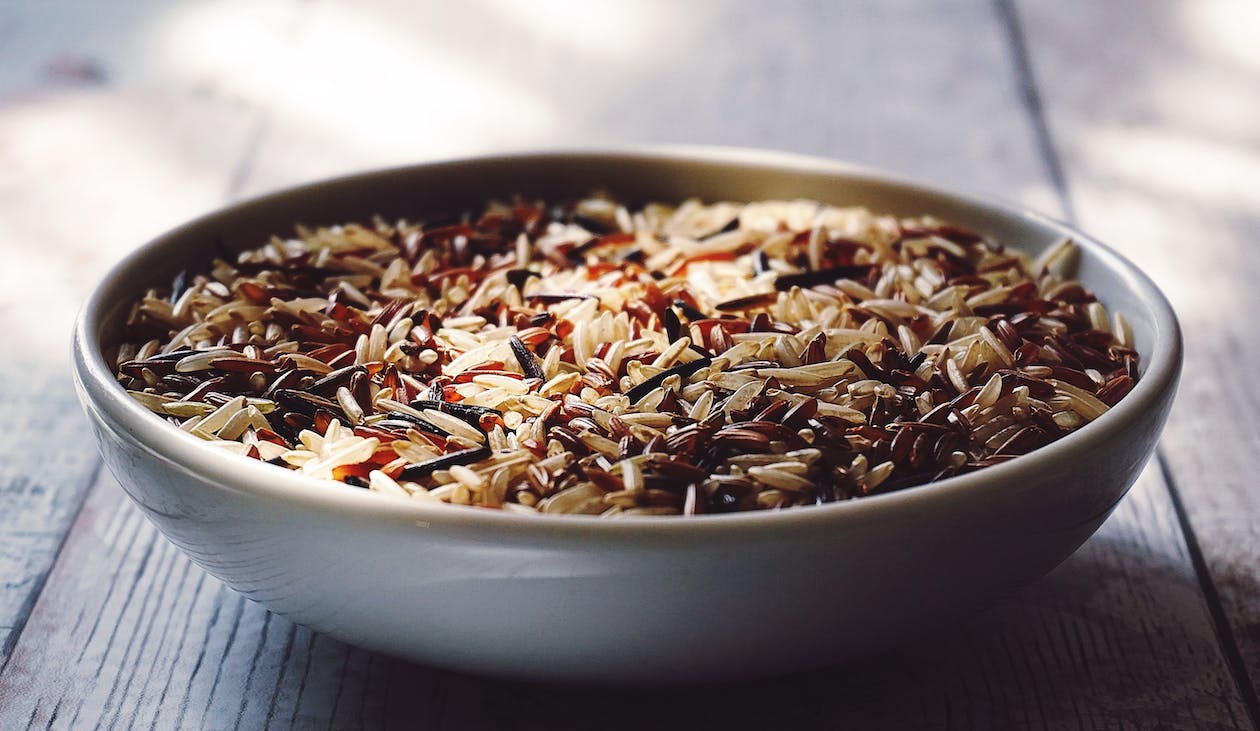
Brown rice contains natural oils that can help promote a healthy heart and cardiovascular system.
Some studies suggest that the fiber and antioxidants in brown rice may help reduce the risk of certain types of cancer in dogs.
Besides, it is essential to remember that rice should only be given to dogs in moderation, as it is high in carbohydrates, and too much can cause weight gain.
It should also be cooked and served plain, without added salt or seasonings.
7. Pumpkin
With so many nutrients packed into one ingredient, pumpkin has many benefits for dogs.
Pumpkin is a cost-effective source of many good nutrients to help keep your dog in good health and tip-top shape.
- It is an excellent source of fiber and can help with digestive issues such as constipation and diarrhea.
- It is also low in fat and calories, which can benefit dogs who need to lose or maintain a healthy weight.
- Additionally, pumpkin is a good source of vitamins A, C, and E, which can help support your dog's immune system and overall health.
- The amino acid in pumpkin is toxic to many dog parasites.
- Research has shown that pumpkin is an excellent source of hydration for dogs, keeping your dog’s skin and coat smooth and supple, and it can be an effective weight loss aid.
When feeding pumpkin to your dog, make sure it is plain canned pumpkin and not pumpkin pie filling, which can contain added sugar and spices that are not good for your dog.

A low-calorie source of fiber and vitamins, it can help support healthy digestion and promote healthy skin and coat.
Add a tablespoon of pureed pumpkin to your dog’s regular meals, mix pumpkin with other ingredients like chicken and rice, or make homemade dog treats using pumpkin.
Conclusion
Dogs require a variety of nutrients in various amounts throughout their lifespan.
As with any food mentioned above, it is essential to feed the food in moderation and consult your veterinarian if you have any concerns about your dog's diet.
If you are still unsure about the nutritional requirements needed for your dog, get in touch with Urban Pet Hospital & Resort, the best pet hospital in Urbandale.